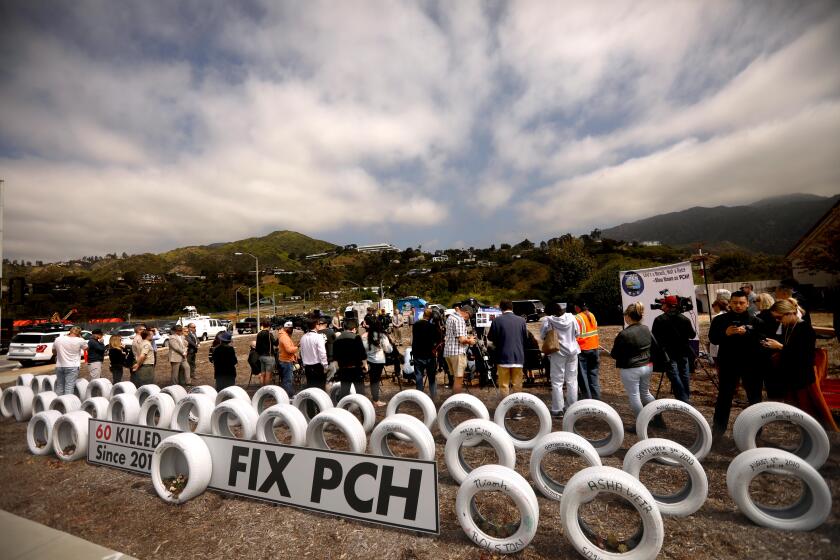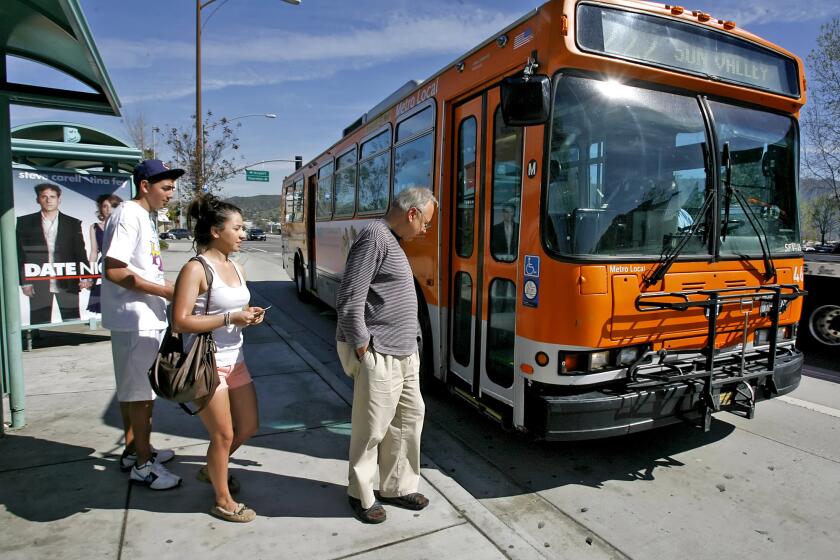Transit Agency Bill Approved by State Senate
Efforts to disband the Southern California Rapid Transit District and replace it with a super-agency took another step forward Thursday when the state Senate passed its own transportation agency reorganization bill.
The measure, by Sen. Alan Robbins (D-Van Nuys), passed on a 26-0 vote and closely paralleled legislation approved, also unanimously, by the Assembly on April 6.
The strong vote in the Senate led backers of the transit agency reorganization to suggest that only time stands between creation of the new super-agency and the disbanding of RTD.
Although there are key differences between the Senate-passed bill and the one approved earlier by the Assembly, neither Robbins nor Assemblyman Richard Katz (D-Sepulveda), author of the first bill, said they think the areas of disagreement are enough to derail their legislative efforts.
They and other lawmakers are critical of RTD’s management and believe that the new agency would be more efficient and better able to deal with gridlock and other regional transportation problems.
Robbins, after his bill passed with little debate, noted that 106 lawmakers have voted to disband RTD without a single “no” vote being cast in either the Senate or Assembly in defense of the troubled transit agency.
“At this point there is no public support left in Los Angeles for the status quo. There have been so many embarrassments in the last six months--one after the other. What politician wants to run on a pro-RTD platform? There isn’t one out of the 120 members of the Legislature who wants to stand up and say, ‘Save what we have,’ ” Robbins said.
Despite the unanimous votes in both houses--and the fact that no organized opposition has surfaced publicly--the legislation enters a delicate, crucial stage when lobbying could become intense and the bills could become subject to wheeling and dealing.
The fact that there are two measures means that there will have to be a reconciliation between versions approved by the Senate and Assembly. That could come as the result of private conversations between Katz and Robbins or in a public legislative conference committee. Both houses will have to vote on the bills again.
With the dismantling of the RTD in sight, however, both Robbins and Katz are looking ahead and expressing concern about the transfer of power from RTD to the new super-agency.
They said they are considering actions to prevent what would be a lame-duck RTD board from signing major contracts or committing large sums of money to projects.
Robbins said he will ask Gov. George Deukmejian to call the Legislature into a special session to vote on the super-agency legislation. Such a move would amount to a technical procedure that would allow the bill to take effect 30 days after the governor’s signature. Otherwise, the earliest either bill could take effect would be Jan. 1, 1988.
“It would be a serious mistake if a lame-duck board would award binding contracts worth hundreds of millions of dollars without going through some kind of review procedure while we’re waiting to get the (super-agency) set up,” Robbins said.
Katz said he is considering what he described as “an anti-fire sale clause.”
‘Spending Spree’
“I’ve got a concern that RTD could go out on a spending spree. We’re looking to see if we have a legislative way to keep that from happening,” he said.
Katz played down differences between the two bills.
“The Senate action makes it very clear that we are going to make a change in Los Angeles, and it’s just a question of working out transition details at this point. Transportation will be different in L.A.,” Katz said.
Like Katz’s bill, Robbins’ would replace the RTD and the Los Angeles County Transportation Commission with a super-agency that would be empowered to undertake responsibilities of both.
Both bills call for the boards running the super-agency to be composed of elected officials, most of them from Los Angeles city and county governments.
Both lawmakers envision operating agencies overseeing three major areas of transportation policy--bus and transit operation, construction of the Los Angeles Metro Rail subway project and long-range planning.
One major area of disagreement is that Katz’s bill states that members of the operating board running the bus operations would be appointed the same way members of the RTD board are appointed.
Strong Objection
Robbins objects strongly, saying members of the new super-agency should be allowed freedom to appoint any kind of board they want to run the umbrella agencies. He said the wording of Katz’s bill might allow some RTD incumbents to be appointed to the new board.
“I don’t want to do anything that might be interpreted as grandfathering RTD. We want a fresh start,” Robbins said.
Katz disputes Robbins’ view. He said the sections of his bill that Robbins objects to, which were the result of several late amendments, are designed to “preserve a geographic representation (on the new board), and that’s all they preserve. They don’t preserve the RTD in any manner, shape or form.”
The assemblyman said all major decisions would be made by the super-agency board, including approval of contracts of more than $5 million. “They will not be able to delegate to another board. There isn’t going to be a major role for that sub-board,” he said.
Robbins wants to call the super-agency the Metropolitan Transportation Authority.
Katz would keep the name of the Los Angeles County Transportation Commission, even though the new agency would have vastly greater powers and bear little resemblance to the present commission.
Debate Over Planning
Another area of disagreement is over the future of the Southern California Assn. of Governments, a regional planning agency. Katz’s bill would give the super-agency responsibility for transportation planning now done by the association. Robbins would retain the association as the chief planning body.
Robbins played down the differences. “None of these are make-or-break issues.
More to Read
Start your day right
Sign up for Essential California for news, features and recommendations from the L.A. Times and beyond in your inbox six days a week.
You may occasionally receive promotional content from the Los Angeles Times.






